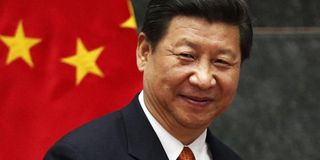China's Xi and Trump tee up Mar-a-Lago summit

What you need to know:
The visit, which will take place at President Trump's resort Mar-a-Lago, follows a rocky start to US-China relations under the billionaire politician, who has repeatedly blasted Beijing for its trade policies and reluctance to bring pressure on North Korea over its nuclear and missile programmes.
China's President Xi Jinping will meet Donald Trump next week in Florida, China's foreign ministry said Thursday, ending weeks of speculation that they were set for face-to-face discussions on thorny issues dividing the world's top two economies.
The visit, which will take place at President Trump's resort Mar-a-Lago, follows a rocky start to US-China relations under the billionaire politician, who has repeatedly blasted Beijing for its trade policies and reluctance to bring pressure on North Korea over its nuclear and missile programmes.
The meeting, which is scheduled for April 6-7, could be crucial in setting the tone of the relationship between the two powers in coming years.
Before arriving in the US, Xi will pay a state visit to Finland, his first to the European Union this year, foreign ministry spokesman Lu Kang told reporters at a regular press briefing.
Just weeks ago the summit seemed a distant possibility after Trump infuriated Beijing with suggestions he might break from the US's long-standing One China Policy.
But in a conciliatory phone call in mid-February, the US president walked back controversial comments on Taiwan, creating an opening for Washington and Beijing to discuss a meeting.
Details of the meeting were reportedly hammered out during subsequent visits by China's top diplomat Yang Jiechi to Washington and US Secretary of State Rex Tillerson to Beijing.
- 'Strategic Kumbaya' -
Diplomatic sources in Beijing told AFP that the meetings will primarily focus on giving the two leaders an opportunity to get to know each other, likely reserving tough issues for future talks.
"The summit could well be a peaceful combination of a strategic kumbaya and economic gift giving, before storms erupt later over trade, regional hotspots, and human resources-issues," according to Douglas Paal, Asia Director at the Washington-based Carnegie Endowment for International Peace.
But it will be hard to avoid discussion of the many tensions that separate the two nations.
"The substantive focus of that meeting, if any, and of the US-China relationship going forward, is likely to revolve around the issues the Trump Administration has signalled it has a strong interest in: trade, North Korea, South China Sea, and Taiwan policy," said Henry Levine, a Senior Advisor to the Albright Stonebridge Group, who previously worked on China issues for the US government.
Trump has threatened to slap punitive tariffs of up to 45 percent on Chinese goods and pledged during his election campaign to label China a currency manipulator.
Relations have been strained by China's fierce opposition to a US missile defence system being rolled out in South Korea to protect against attacks from the North.
Beijing has been reluctant to put pressure on Pyongyang, its neighbour and historic ally, for fear of destabilising its neighbour.
On February 18th, in what was widely interpreted as a gesture to the US, Chinese authorities announced a halt to imports of coal from the North -- a crucial source of foreign exchange -- but customs data show that China imported nearly $100 million worth of coal last month, up 40 percent from the year before.
- Building bonds -
Xi would be the second world leader since Trump took office to visit Mar-a-Lago, which Trump has dubbed the "Winter White House."
The resort's casual nature will allow Trump to receive the Chinese leader without the full pomp and circumstance of a state visit.
The US president hosted Japanese Prime Minister Shinzo Abe at the estate in February in a meeting billed as an opportunity to bond over rounds of golf in an environment conducive to building the kinds of personal relationships that Trump is said to view as important.
Xi, however, is unlikely to join Trump on the links.
China's ruling Communist party frowns on golf as a bourgeois luxury and has taken steps to crack down on courses in China, which it associates with corruption.




